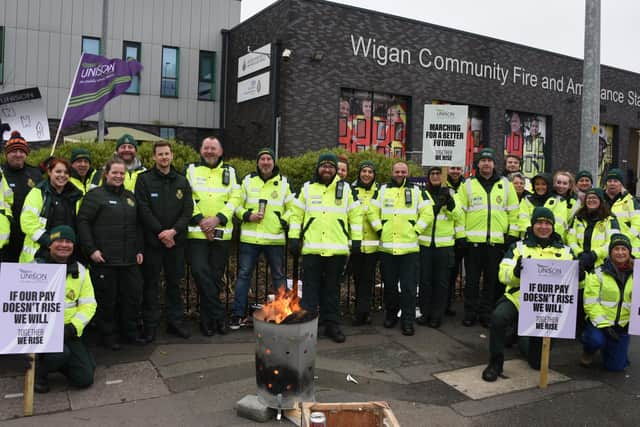North West Ambulance Service bosses prepare for two more days of strike action by trade union members
and live on Freeview channel 276
North West Ambulance Service (NWAS) leaders say they will aim to reach as many patients as possible on Monday and Wednesday and people should still call 999 in an emergency.
However, to ensure those with the greatest need receive a response, those calling 999 when there is no immediate threat to life may be advised of alternative ways to get help.


Advertisement
Hide AdAdvertisement
Hide AdMembers of the Unite and GMB trade unions will take part in a 24-hour strike on Monday, while Unison members will take action short of strike.
That will be followed by a strike by Unison members from 9am to 11pm on Wednesday and GMB members will take action short of strike.
NWAS bosses say the number of ambulances on the road will be boosted with support from the military and private providers.
Senior clinicians will be based in the control rooms to help prioritise ambulances when available, and NWAS is working with NHS and healthcare partners to ensure the system is as prepared as possible.
Advertisement
Hide AdAdvertisement
Hide AdDirector of operations Ged Blezard said: “Two of the unions involved have confirmed they will only allow striking ambulance crews to cover the most life-threatening incidents (category one). This means fewer resources are available for strokes, heart attacks and other emergency incidents.
"And while not all three unions are striking at the same time, those that aren’t have told us they will take an approach (action short of strike) that severely weakens our ability to share resources across the North West and provide cover where it is needed.
“We need the public to be aware of the situation and again play their part in helping us to keep resources available for those who really need us.
“Please only call 999 in life-threatening emergencies. Other patients will likely be advised by our staff to make their own way to hospital or receive information about where else to seek help. Patients should take advice from 111 or 999 call-handlers on whether there are circumstances where it is suitable for them to make their own way to hospital.
Advertisement
Hide AdAdvertisement
Hide Ad“Typical reasons to call 999 include cardiac arrest, loss of consciousness, fits that aren’t stopping, breathing difficulties, severe bleeding, allergic reactions and serious head injuries, heart attack or stroke.
“Your GP or pharmacist will still be available to provide non-urgent health advice and you can use NHS 111 online if you are unsure where to go.
“Due to the growing concerns about the response we are able to provide, we are calling for a swift resolution to the dispute between the Government and trade unions”.
Industrial action will also affect the 999 control rooms, so people are being asked to not repeatedly call 999 asking for updates on their ambulance.
People using the patient transport service (PTS) on Monday and Wednesday could also be affected, as it will only be available for renal, oncology and palliative care appointments.
